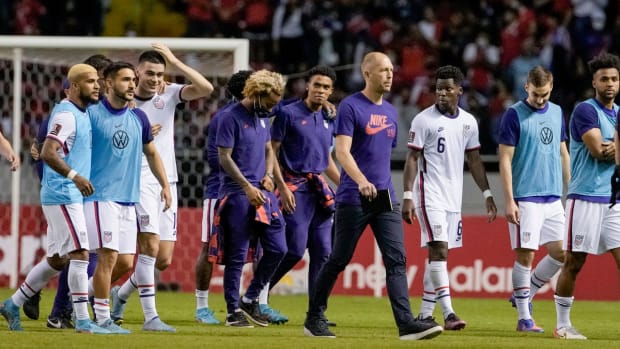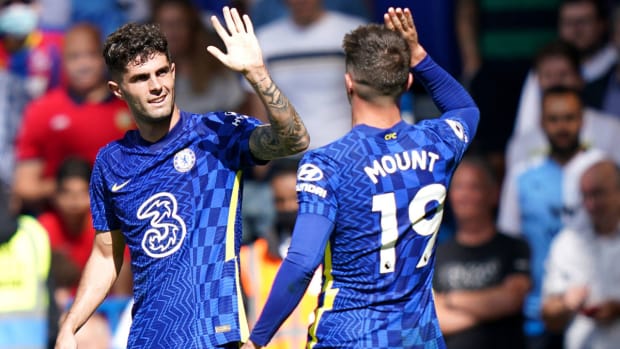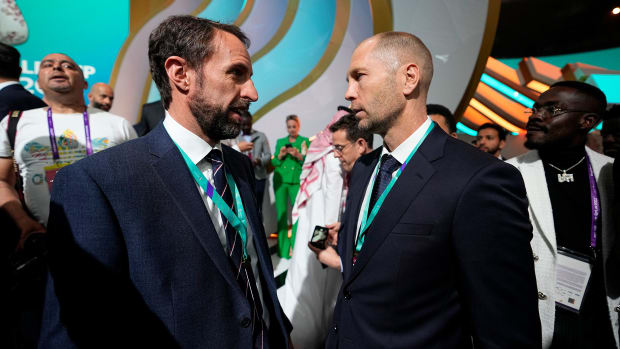There were three Concacaf qualifiers in three countries across seven days, a pair of red-eye flights, a long coaches meeting in Qatar, FIFA’s pomp and cringe and then multiple media interviews. That’s a lot to endure and absorb. But U.S. coach Gregg Berhalter still had enough energy to revel in Friday’s World Cup draw in Doha, not to mention the opportunities and challenges awaiting his young team in November. This was what the past three years—all that effort, planning and overhaul—were about. After missing out in 2018, the American men are back in the World Cup.
“I don’t even know what day it is. But I’m going on fumes and it’s a positive type of fumes that you’re going on. I’m at the World Cup draw. I’m not complaining right now about being tired,” Berhalter said Friday.
There are complications amid the relief and excitement, highlighted by the fact that the U.S. will play an undetermined opponent on Nov. 21, the World Cup’s opening day. Along with top seed and European Championship runner-up England and Asian heavyweight Iran, the Americans landed in Group B with the country that emerges from the Wales vs. Scotland/Ukraine playoff in June. Competing early in the World Cup eats into potential preparation time, which was already abnormally short. Clubs aren’t required to release their players until Nov. 14.
“We had plans to go to Dubai a week before with the entire team. I don’t think that’s going to happen,” Berhalter revealed. “So a little bit of change in plans based on when we’re playing, but we’ll deal with it.”

Moises Castillo/AP
The U.S. will use six matches played in June (four) and September (two) to build toward the tournament. It’ll then have to hit the ground running in Qatar. After their opener against the UEFA playoff survivor, the Americans will contest two games drenched in narrative. First comes England, the big-name, high-profile title contender that occupies a strange role, relative to the U.S., as a benchmark, a barometer and a condescending big brother. Group play then concludes with Iran, Asia’s top-ranked side. The geopolitical overtones of that showdown will spark plenty of discussion between now and November.
It’s not the most difficult group the U.S. could’ve drawn. Reigning champion France, Brazil, Argentina and Spain were among the elite top seeds that were avoided. And the U.S., which was placed in pot No. 2 as FIFA’s 15th-ranked team, escaped having to face pot No. 3 powers Poland, Serbia and Senegal, while long-time nemesis Ghana and, potentially, Peru, were possibilities out of pot No. 4. But two European foes make any group tough, the England game will generate constant headlines and Iran is an intriguing and possibly dangerous unknown.
“It was amazing to get England in our group. I think that’s a game that always has a lot of attention around it because of England and their fans, and their established place in soccer,” Berhalter said.
“Iran, in general, I think is going to be a great challenge for us. I’m a little bit nervous that the public or the media may take Iran lightly. But it’s not a team to take lightly. It’s going to be a good opponent,” he added. “So overall, it’ll be a strong group. When you add that European team to it, it’s going to be a well-rounded group and it’s going be difficult to advance. But that’s a positive, because I think everyone’s going to be battling and … I think it will come down to the last game.”
Frequent U.S. captain and qualifying stalwart Tyler Adams said that groups tend to unfold differently on the field than they’re expected to on paper.
“I feel like you start to realize, now going through processes like qualifying and just watching World Cups before, is there’s really no easy game,” the RB Leipzig midfielder explained. “When everyone’s playing on such a stage, what you think is going to be the easiest game ends up being the hardest game.
“So I honestly didn’t have any expectations going into [the draw]. I’ve had a couple Champions League draws now, and I’ve had what’s the ‘group of death’ where we had Man City and PSG, and then I’ve had groups that are quote-unquote a little bit easier. And they didn’t turn out to be easier,” Adams added. “So for me, just heading into this, it was just exciting to see our country called at the end of the day.”
Soon after the U.S. had its name called, Christian Pulisic’s phone rang. It was his Chelsea teammate, England’s Mason Mount.

Tess Derry/PA Images/Imago Images
“We’re already talking, excited, looking forward to the game,” Pulisic said. “We’re good friends, good teammates, and it’ll be interesting to play against them in a World Cup.”
Pulisic is one of a handful of U.S. players with ties to England. Several play in the Premier League or Championship, left back Antonee Robinson is a native and midfielder Yunus Musah spent a chunk of his childhood there. And those connections are just the start for two countries that share such significant cultural and athletic bonds. While one is the birthplace of the game and the other is relatively new to it, the exposure English football enjoys in the U.S. is massive and its influence on U.S. soccer is immeasurable. The youthful Americans will hope that familiarity bridges some of the potential gap in experience and comfort under the World Cup spotlight.
“I think everyone really knows a lot about England and what they have to offer, and their roster and the players that they have, the caliber of them,” U.S. midfielder Weston McKennie said. “We all know what we’re up against and we all are pretty familiar. Some players play with them in England. Some players play against them in England. Some play against some place else. So we kind of are familiar in terms of what our opponents are going to look like.”
England is a surprising 0-1-1 at the World Cup against the U.S., but the British press was, predictably, expecting victory later Friday. The Daily Mirror’s front page blared “Yankee Doddle Dandy”—“doddle” is a Britishism for something easily accomplished—and called Group B “England’s Qatar Group of Life.” The Daily Mail called it a “Dream Qatar World Cup Draw.”
That lack of respect isn’t shared by England manager Gareth Southgate, who told the BBC, “They’ve got some good players and we know what they could be capable of as a nation. So that, in particular, is an intriguing game.”
Like Berhalter, Southgate prioritizes team culture and relationships and presided over a change in national team generations. The England that finished fourth at the 2018 World Cup and then lost the Euro final on penalties is a more modern, unified and dynamic team than many predecessors. Berhalter was so impressed with Southgate’s work that he called the England coach while considering the U.S. job.
“Gareth was the first person I reached out to outside of former U.S. coaches, and the reason why is because I saw a lot of synergies or similarities between the team that he took over, and the team that we took over,” Berhalter said. “We knew it was going to be a new generation of players coming through. We knew we’re going to be working with a very young group. I thought it was important to establish a strong culture within the team, and I picked his brain early on in 2018.
“As soon as I got hired, my first trip [to Europe] I met with him and we talked at length and we stayed in touch ever since then. I consider him an excellent coach, and have a lot of respect for what he’s done with the program.”

Hassan Ammar/AP
Berhalter is well aware, however, how this particular game’s meaning and symbolism may exceed the others.
“You hear [new Leeds United coach] Jesse Marsch and some of his comments about what he has to go through, and I think at some point it’s almost like too much, right? You’re an established coach. You do really well, and you’re treated like that. Whereas if he was from somewhere else—from Portugal for example—he’d be treated completely different. And [former Swansea City coach] Bob Bradley the same way,” Berhalter said regarding the way U.S. coaches have been regarded by the English press and public.
“I know that there is a lot of respect for American soccer, but I think this is an opportunity. For sure, this is an opportunity for us to show what we’re made of,” Berhalter continued. “They have a good team, but so do we. We have a young team. We have an athletic team. We have a team that doesn’t have a lot of fear, and it’s going to be a great game. And I think even for the fans to be so familiar with their players, their household names, and then to see us match up against them, I think will provide some context.”
There will be more than seven months to dissect the multitude of storylines and threads. Iran will become less of a mystery, and that opening-game opponent will emerge. On Friday, as Berhalter and his players were taking it all in, it was more about the excitement of returning to this stage and, as Adams said, simply seeing the U.S. included in the draw and imagining what might be possible.
“Qualifying for the World Cup was a task that we needed to accomplish, and we checked that off. But now is the time where we’re going to be able to enjoy this moment as players,” Adams said. “We wanted, again, to change how everyone looks at us as players and as a nation, and ultimately gain the respect of fans around the world—let alone our own fans. So it’s going be important that now we have the mindset going into this tournament that we have really good performances.”
Pulisic doesn’t want to wait. In fact, he said he’s happy to be playing on the first day.
“To be honest, the sooner the better for me. I think it’ll be good to play right as the tournament starts,” he said. “I’m just counting down the days, so I guess the sooner the better. I don’t really mind. I’m just looking forward to it.”







